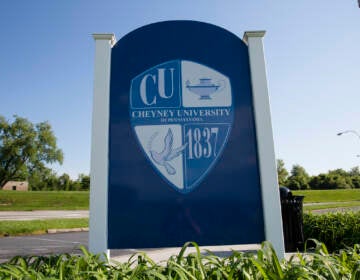Lincoln University’s upward mobility
Under President Allen's leadership, the university has restructured administration to give it more of a presence in Harrisburg and create better support systems for students.

Lincoln University students Joseph Purnell, Jeremiah Johnson, and Christian Harris talk about why they chose to attend the historically black college. All three students are members of Groove Phi Groove Inc. (Abdul R. Sulayman/The Philadelphia Tribune)
This story originally appeared on The Philadelphia Tribune.
—
Christian Harris was one of the only Black kids in the predominantly white Catholic and charter schools he attended as he was growing up in Philadelphia. The other kids called him “Black Chris.”
So when it came time for him to go to college, there was only one place he wanted to go: Lincoln University.
“This campus has a really nice history and I wanted to be a part of that,” said Harris, who is now a junior in the Pan Africana studies program. “This was my only choice.”
Lincoln, which turns 165 this year, offers a niche for college students who are leaving home and want to live and study liberal arts in a small historically Black environment, said Lincoln President Brenda Allen.
Going forward, Allen wants to make the university in Chester County a “destination.”
“In five years, people who don’t know us will know us then,” she added. “Somewhere along the line, with all the shifts and changes in higher ed, Lincoln in its significance has sort of faded and we want to bring it back — bring people’s attention back to the great things that are happening here.”
To succeed, Lincoln needs to work on letting people know what sets the university apart, according to Marybeth Gasman, a professor of higher education at the University of Pennsylvania who has been studying HBCUs for decades.
“The institution has excellent STEM programs,” Gasman said. “They also have a beautiful campus with first-rate facilities. It would be great to get more people on campus to see what they are doing and to be more explicit about sharing the good work.”
Allen said Lincoln is working to develop strong intellects in its students and prepare them for rapid changes in technology. Allen believes that most of the jobs in the economy now and in the future will require students to be well-rounded and have technological expertise, she said in a United Negro College Fund panel last year.
“Even as an artist you have to understand technology and how it applies to your work,” Allen said last year. “We need all of these STEM (Science, Technology, Engineering and Math) majors to do the science and engineering. But if they lack a humanist’s understanding, any application that they can bring forward is going to be limited. So, what we want to bring together the areas of study that produce well-rounded, intellectually flexible and strong individuals.”
The university currently has approximately 2,100 undergraduate and 254 graduate students enrolled — an increase from 2017, when undergraduate enrollment was 1,897 and graduate enrollment was 221.
Under Allen’s leadership, the university has restructured administration to give it more of a presence in Harrisburg and create better support systems for students.
Seitu Stephens, the director of community and government relations, helps get Allen introductions with federal officials, members of Congress and state legislators. Allen hopes the position will help the college have a presence in Harrisburg, Washington, D.C., and to receive more funding and build relationships with legislators.
Also, new class deans work with students and faculty members to provide support and solve problems.
Gasman said the college seems to have more stability now, adding that “the liaison will help the state and folks in D.C. understand (Lincoln’s) strengths and challenges more fully,” and “class deans will be able to help with student retention.”
Mia Joseph, a 19-year-old sophomore from Boston who is studying political science and criminal justice, said she feels like Lincoln is a place where she can grow.
“I went to three different high schools so I never technically had a home, but I love Lincoln so much,” Joseph said. “They really let you shine here and they boost you up.”
Joseph loves giving tours to prospective students and showing them the dormitories where famous graduates like poet Langston Hughes and former Ghanian president Kwame Nkrumah stayed.
Students also credit Allen with creating more activities for students to participate in.
“I feel like the campus life has been magnified now (in terms of collaborations among different groups),” said 22 year-old senior Joseph Purnell, a Pan Africana studies student from Northeast Philadelphia and a member of Groove Phi Groove Inc., a social fellowship organization. “You’re not forced to be in a box. You can be yourself and I feel like she understands that.”
Jeremiah Johnson, a 20-year-old freshman from Washington D.C. who is studying criminal justice, said he learned about Lincoln on a tour similar to the ones Joseph leads and fell in love with the campus.
“When I came here I didn’t even know it was the first HBCU [to grant degrees] or an HBCU period,” Johnson said. “I just like the environment and the fact that it was quiet. The area is private.”
And it’s a place where the students can be themselves.
Harris said he likes being at Lincoln because “I can speak up on issues that pertain to me. I think it’s a cultural thing, maybe. There’s a big experience that I enjoy here. I think other students enjoy it, too.”
WHYY is your source for fact-based, in-depth journalism and information. As a nonprofit organization, we rely on financial support from readers like you. Please give today.




